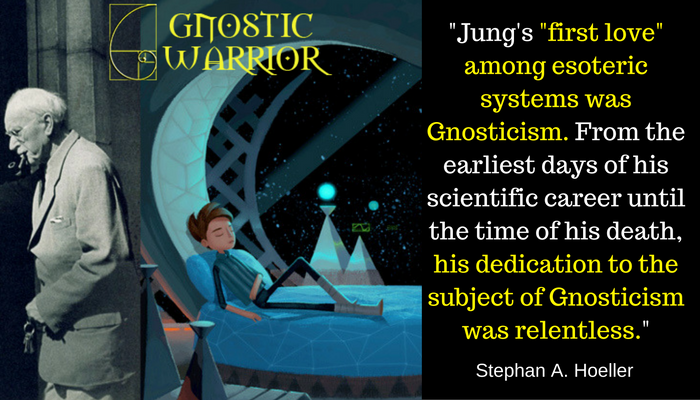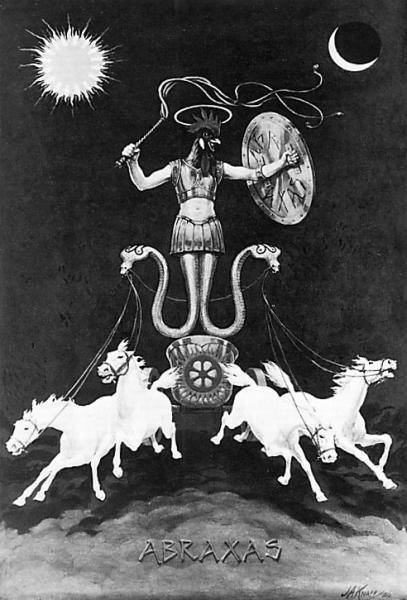by Moe | Dec 13, 2016 | Quotes

“Jung’s “first love” among esoteric systems was Gnosticism. From the earliest days of his scientific career until the time of his death, his dedication to the subject of Gnosticism was relentless.
As early as August, 1912, Jung intimated in a letter to Freud that he had an intuition that the essentially feminine-toned archaic wisdom of the Gnostics, symbolically called Sophia, was destined to re-enter modern Western culture by way of depth-psychology.
Subsequently, he stated to Barbara Hannah that when he discovered the writings of the ancient Gnostics, “I felt as if I had at last found a circle of friends who understood me.”
By Stephan A. Hoeller – Gnosis: A Journal of Western Inner Traditions (Vol. 8, Summer 1988)
by Moe | Aug 5, 2016 | Gnosis, Mystical Christianity
By 33rd Degree Freemason, Manly P. Hall – “The School of Gnosticism was divided into two major parts, commonly called the Syrian  Cult and the Alexandrian Cult. These schools agreed in essentials, but the latter division was more inclined to be pantheistic, while the former was dualistic.
Cult and the Alexandrian Cult. These schools agreed in essentials, but the latter division was more inclined to be pantheistic, while the former was dualistic.
While the Syrian cult was largely Simonian, the Alexandrian School was the outgrowth of the philosophical deductions of a clever Egyptian Christian, Basilides by name, who claimed to have received his instructions from the Apostle Matthew. Like Simon Magus, he was an emanationist, with Neo-Platonic inclinations. (more…)
by Moe | Mar 22, 2016 | Alchemy
Here is an explanation of alchemy from the Secret Teachings of All Ages by 33rd Degree Freemason, Manly P. Hall. Please  keep in mind that Manly Hall and most of these authors that speak on these subjects were initiated into secret societies such as the Freemasons or Rosicrucians where they had taken oaths of secrecy.
keep in mind that Manly Hall and most of these authors that speak on these subjects were initiated into secret societies such as the Freemasons or Rosicrucians where they had taken oaths of secrecy.
Alchemy and Its Exponents | Chapter 33 – by Manly P. Hall
Is the transmutation of base metals into gold possible? Is the idea one at which the learned of the modern world can afford to scoff? Alchemy was more than a speculative art: it was also an operative art. Since the time of the immortal Hermes, alchemists have asserted (and not without substantiating evidence) that they could manufacture gold from tin, silver, lead, and mercury.
That the galaxy of brilliant philosophic and scientific minds who, over a period of two thousand years, affirmed the actuality of metallic transmutation and multiplication, could be completely sane and rational on all other problems of philosophy and science, yet hopelessly mistaken on this one point, is untenable. Nor is it reasonable that the hundreds declaring to have seen and performed transmutations of metals could all have been dupes, imbeciles, or liars. (more…)
by Moe | Jan 21, 2016 | Gnosis
“It is no small thing—this Gnosis of ten-thousand-times-great Hermes, as Zosimus in an ecstasy of enthusiasm calls Him;
For it has as its foundation the Single Love of God, it endeavours to base itself upon the True Philosophy and Pure Science of Nature and of Man, and is indeed one of the fairest forms of the Gnosis of the Ages.
It is replete with Wisdom (Theosophia) and Worship (Theosebeia) in harmony—the Religion of the Mind.
It is in its beginning Religion, true devotion and piety and worship, THE based on the right activity and passivity GNOSIS of the Mind, and its end is the Gnosis of things-that-are and the Path of the Good that leads man unto God.”
The Gnosis of the Mind By George Robert Stow Mead, Hermes (Trismegistus.)
by Moe | Nov 23, 2015 | History of the Brotherhood
There have been many great female philosophers over the last two thousand years. The meaning of word philosopher is from the Greek word philo, which means love and sophia which means wisdom. Rather than chasing vanity, and a material life, these women had chosen that path of wisdom. (more…)


 Cult and the Alexandrian Cult. These schools agreed in essentials, but the latter division was more inclined to be pantheistic, while the former was dualistic.
Cult and the Alexandrian Cult. These schools agreed in essentials, but the latter division was more inclined to be pantheistic, while the former was dualistic.
